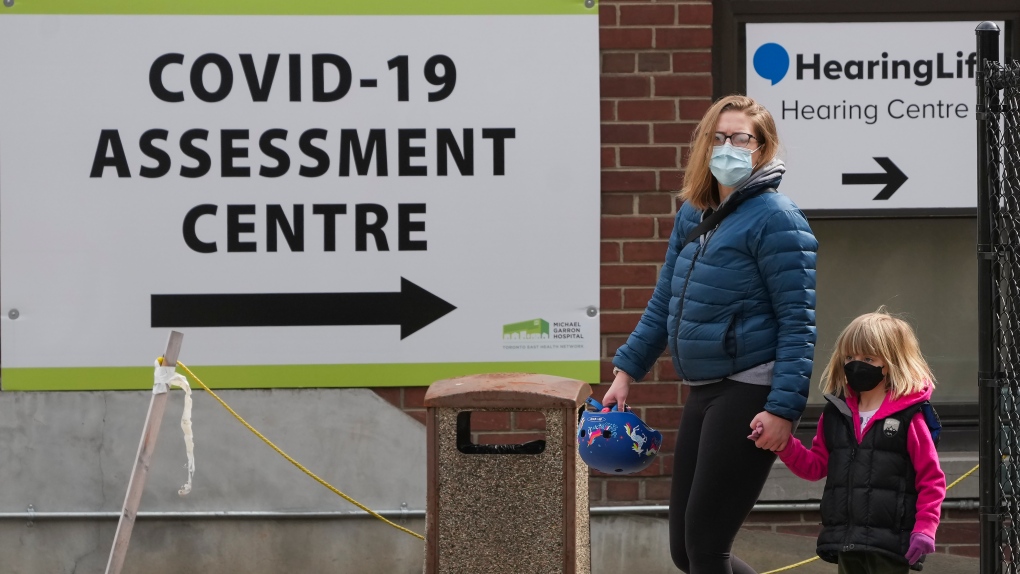Study finds links between air pollution and severity of COVID-19 infection in Ontario
 People walk past a COVID-19 assessment centre outside a hospital in Toronto on Monday, April 4, 2022. THE CANADIAN PRESS/Nathan Denette
People walk past a COVID-19 assessment centre outside a hospital in Toronto on Monday, April 4, 2022. THE CANADIAN PRESS/Nathan Denette
An extensive study of thousands of COVID-19 patients in Ontario hospitals found links between the severity of their infections and the levels of common air pollutants they experience.
"This adds to existing evidence that air pollution is a silent killer," said Chen Chen, an environmental epidemiologist at the University of California and lead author of the study published in the Canadian Medical Association Journal.
The study looked at more than 150,000 COVID-19 cases in Ontario patients in 2020. It broke out how many of those patients were admitted to hospital because of the disease, how many were transferred to intensive care units and how many died.
Researchers then turned to previously developed data that combined air monitoring records with other sources, such as satellite imagery, to model levels across Ontario of three common pollutants -- fine particles, nitrogen dioxide and ground-level ozone.
Nitrogen dioxide is emitted in engine exhaust, which then breaks down in the atmosphere into ozone. All three pollutants together create smog.
The scientists then combined the health and pollution data, using statistical methods to weed out the effects of more than 10 different "confounding factors," such as pre-existing conditions and economic status.
The researchers were able to show that more severe reactions to the virus were associated with higher levels of long-term exposure to air contaminants.
For every 25 per cent increase in fine particles a patient had been exposed to, the chance of being admitted to hospital after being infected with COVID-19 increased by six per cent and the odds of being admitted into an ICU increased nine per cent. The team found no links between death rates and particulate exposure.
The effects were smaller for nitrogen dioxide.
But for ground-level ozone, the study found correlations for every 25 per cent increase in exposure were much higher.
The chances of hospital admission increased 15 per cent. Intensive care admissions increased 30 per cent and death rates went up 18 per cent.
"Of those people who were already infected, we observed some of them who were exposed to higher air pollution levels prior to their infection have a higher probability of worse outcomes," Chen said.
The study builds on previous research that looked at immediate links between pollution levels and COVID-19 infections. Chen said that approach fails to capture what could be the long-term effects of air pollutants.
"We were looking at long-term pollution levels and their impact on COVID severity."
Chen cautioned the study doesn't establish that the three pollutants actually caused the worsening COVID-19 outcomes.
But it wouldn't be a surprise. Those contaminants are all known to irritate lungs and lung function, and COVID-19 is a pulmonary disease.
"We know this virus attacks our pulmonary system," she said. "It's possible that being exposed to more air pollution prior to infection makes you more susceptible."
Chen said the study opens the door to more detailed research on the variation in COVID-19 outcomes. What is the impact of age, for example, or economic status?
As well, the study doesn't look for the mechanism of how air pollution might work to worsen the disease.
"This research raises a lot of questions," said Chen.
This report by The Canadian Press was first published May 24, 2022.
CTVNews.ca Top Stories

Calls for Ottawa to end Canada Post strike mount as businesses face challenges
As the Canada Post strike nears its three-week mark, stores across the country have turned to alternate measures to send products to paying customers and keep operations running smoothly.
Trump making 'joke' about Canada becoming 51st state is 'reassuring': Ambassador Hillman
Canada's ambassador to the U.S. insists it's a good sign U.S. president-elect Donald Trump feels 'comfortable' joking with Canadian officials, including Prime Minister Justin Trudeau.
Mexico president says Canada has a 'very serious' fentanyl problem
Foreign Affairs Minister Mélanie Joly is not escalating a war of words with Mexico, after the Mexican president criticized Canada's culture and its framing of border issues.
Search extends into the night for Pennsylvania woman who may have fallen into sinkhole
A grandmother looking for her lost cat apparently fell into a sinkhole that had recently opened above an abandoned western Pennsylvania coal mine and rescuers worked late into the night Tuesday to try and find her.
From niche grocer to supermarket giant: How T&T plans to repeat success in the U.S.
Canada's biggest Asian grocery chain is expanding into the U.S., hoping to bring its patented array of food, skin care and more to a new market.
3 bills affecting transgender Albertans pass debate, set to become law
A trio of bills affecting transgender people in Alberta have passed the final stage of debate in the legislature and are set to become law.
Freeland says it was 'right choice' for her not to attend Mar-a-Lago dinner with Trump
Deputy Prime Minister and Finance Minister Chrystia Freeland says it was 'the right choice' for her not to attend the surprise dinner with Prime Minister Justin Trudeau at Mar-a-Lago with U.S. president-elect Donald Trump on Friday night.
Additional weather warnings issued in the Maritimes ahead of Thursday storm
Additional weather alerts are in place in New Brunswick and Nova Scotia as an early December storm approaches the Maritimes.
South Korea's opposition parties submit a motion to impeach President Yoon over sudden martial law
South Korea's opposition parties Wednesday submitted a motion to impeach President Yoon Suk Yeol over the shocking and short-lived martial law that drew heavily armed troops to encircle parliament before lawmakers climbed walls to re-enter the building and unanimously voted to lift his order.
































